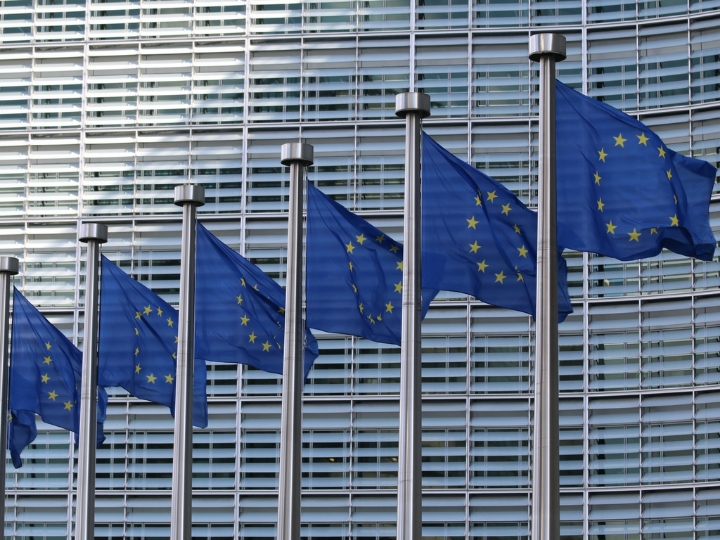The European Commission on Thursday (28 April) warned buyers of Russian gas they could breach sanctions if they converted gas payments into roubles, as officials struggled to clarify the EU’s stance on Moscow’s payments scheme, which has sowed confusion in the bloc.
Russian gas giant Gazprom cut supplies to Poland and Bulgaria on Wednesday (27 April) after they refused to pay for gas in roubles, marking Moscow’s toughest response yet to sanctions imposed by the West over the conflict in Ukraine.
The demand for roubles is largely interpreted as a ploy by the Kremlin to weaponise its gas supply and create legal loopholes in sanctions decided by the EU against Russia for its invasion of Ukraine.
European Union energy ministers will meet on Monday to discuss the situation, which has left member states divided over whether sanctions would be broken if they used Russia’s mechanism.
To meet its demand, Russia ordered that energy companies from “unfriendly countries” change their gas payments into roubles at Gazprombank, a request that some in the EU, including Germany, said did not break sanction rules.
“The payments will be made in euros and then transferred by Gazprombank into a so-called K account,” said German Economy Minister Robert Habeck, whose country is hugely dependent on Russian gas.
“That’s the path that we’re taking, that’s the path that Europe has shown us, that is the path that’s compatible with sanctions,” he added.
A violation of EU sanctions?
But others, including the European Commission, which drafts sanctions for the EU, warned that the transfer could constitute a violation, putting gas importers in legal danger.
“If the contract stipulates that payments should be made in euros or in dollars, then the company’s obligation ends once it has made that payment in euros or dollars,” EU spokesman Eric Mamer said.
“If the payment takes place in roubles, then we are no longer talking about the agreed contract and we’re talking about a circumvention of the sanctions,” he said.
The difficulty for European buyers is that the Russian decree requires them to also open a rouble account at Gazprombank into which their euro or dollar payments would be deposited after conversion into the Russian currency.
Russia’s decree would only consider the payment to be complete after the gas-to-roubles converson is done – a transaction that would involve Russia’s central bank, which is subject to EU sanctions.
Speaking at a briefing on Thursday, a senior EU official said that if EU buyers declare their payments for gas are completed once the payment has been made in euros and before it is converted into roubles, sanctions would have been respected.
“What we cannot accept is that companies are obliged to open a second account and that between the first and second account, the amount in euros is in the full hands of the Russian authorities and the Russian Central Bank, and that the payment is only complete when it is converted into roubles,” the senior EU official said.
“This is absolutely clear circumvention of the sanctions.”
Opening a roubles account at Gazprombank in itself may breach the EU sanctions, the official added, without providing a conclusive assessment of that.
Thursday’s clarifications followed a demand on Wednesday from EU country ambassadors for clearer advice on the issue.
Poland and Bulgaria said in the meeting that the Commission’s guidance was confusing, while countries including Denmark, Finland, Greece, Slovakia and Spain said more clarity was needed, EU officials told Reuters.
Both Bulgaria and Poland opposed the new payment mechanism and stuck to their original contracts to pay for gas. Bulgaria’s deputy prime minister said the US dollars intended to use to pay Gazprom for April supplies had been returned.
Officials also said countries disagreed on whether sending euros to Gazprombank that would then be converted into roubles by a Russian bank would amount to a breach of sanctions, as the Commission has said.
The Kremlin has said payments for deliveries that took place after Putin’s decree last month were expected in May and a source who requested anonymity named May 20 as “validation” date for payments.
Some EU gas traders have reportedly opened roubles accounts, but Commission officials said they had not been notified of any gas buyers doing this.
Gazprom and Gazprombank did not respond to requests for comment.
Different interpretations
Hungary has said it plans to pay for Russian gas in euros through Gazprombank, which will convert the payment into roubles to meet the new requirement. Greece also said it plans to pay Gazprom next month in a way that will not breach EU sanctions against Russia, the country’s energy minister said.
Finland said EU-level guidelines are needed so countries do not arrive at different interpretations of the payment mechanism.
Finnish utility Fortum, in which the state of Finland holds a 50.76% stake, said earlier on Thursday its German subsidiary Uniper would continue to pay in euros for gas from Russia’s Gazprom via the new payment mechanism.
But Finland’s minister in charge of European affairs said Uniper should adhere to the German government’s energy policies.
Germany, which is heavily reliant on Russian pipeline gas, has warned that it could go into recession if it were cut off from all Russian energy.
Three sources said on Thursday that Italian energy group Eni has yet to make a decision regarding the payment scheme Russia has introduced and is still waiting for clarity on whether it amounts to a breach of sanctions.
*first published in: www.euractiv.com




 By: N. Peter Kramer
By: N. Peter Kramer
